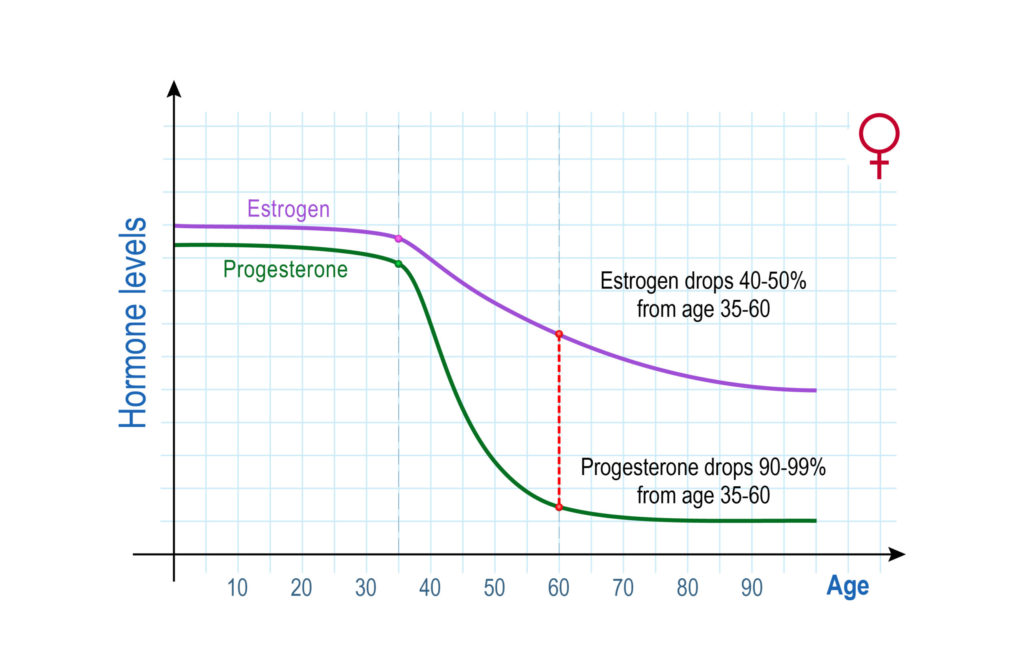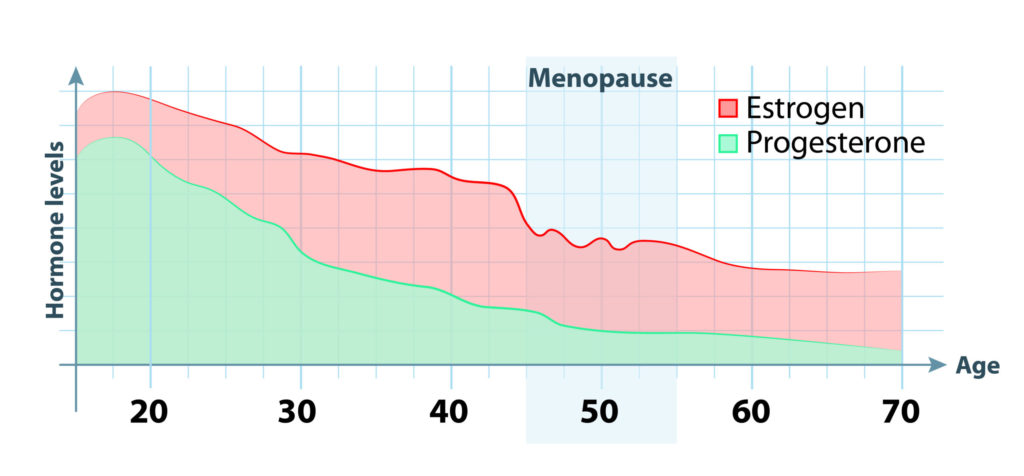IMPORTANT NOTE [Make sure you bookmark this page before you forget. By all means read this on your own first, but we highly recommend you and your partner read this together and promise to be kind to each other while you do]
Menopause is 100% guaranteed
This is a basic fact, often over looked in the big scale of things. However, what is not certain is when menopause will start for each woman, how many widely different symptoms are experienced as her hormones come crashing down, and if the sudden decline will impact on her quality of life, and the people around her.
Short story (45 sec read)
- Menopause is not optional – all women will go through it. That’s approximately 50% of the World’s population.
- There is no competition winner for putting up with symptoms the longest.
- The sooner a woman receives the right diagnosis and support, the quicker they can heal.
- There are three stages to menopause that can last a very long time and have many different symptoms. It can start around the age of 40 called peri-menopause, leading to menopause around 52 and then beyond into post-menopause. Some women can still experience debilitating symptoms into the 60’s.
- Hormone Replacement Therapy (HRT) is the gold standard solution to symptom relief and the only regulated treatment.
- Taking HRT has been shown in many studies to reduce the risk of osteoporosis, heart disease, diabetes, depression, osteoarthritis and dementia.
- Some women are unable to take HRT and there are very small risks associated with HRT, but the higher health risk is seen with being over-weight, smoking and consuming more than 2 units of alcohol daily.
- All women need to be given individualised advice about their menopause which should include advice about their lifestyle including exercise and nutrition to support their entire well-being during this time of change and beyond. Many women will be menopausal for decades so it is essential they are given the correct diagnosis and support to ensure the menopause is a positive and healthy experience.
- Affordable help is available today from experienced menopause specialist nurses.
Full story (5 minute read)
Is your partner saying things like …
- ‘I don’t feel like I am in my own body anymore’.
- ‘I don’t know what’s wrong with me and I can’t even begin to describe it’.
- ‘Why do my bones ache, and why am I so tired’?
- ‘I just want be left alone’.
- ‘My periods are all over the place and I’m constantly worried when they will stop and start’.
Are you noticing things like …
- She’s lost her confidence and seems anxious over things that never bothered her before
- Becomes seriously tearful over random things
- Is she avoiding activities with her friends and family and not really explaining why
- She’s not sleeping well at all and tossing and turning at night
- She’s become uncharacteristically forgetful and now you’re making jokes about the car keys in the fridge!
- You want to give her a hug, but somehow you never seem to time it right
Here’s why, this is what’s happening?
If your partner is around her mid 40’s, or thereabouts, it’s highly likely that rapidly reducing levels of hormones are responsible for some of these symptoms/reactions you have both observed. The process is called hormonal decline and indicates the beginning of the menopause.* It’s possibly the biggest health & wellness hurdle you will face in your relationship.
Menopause doesn’t just happen overnight. It’s a gradual loss of certain hormones, and in some cases the deficiency can bring about a whole host of chemical changes in a women’s body that manifest themselves, not only physically, but mentally as well.
Some symptoms could be – anxiety, low mood, hot flushes, crushing fatigue, brain fog, poor concentration, low self-esteem, sudden weight gain, itchy skin, insomnia, vaginal dryness, night sweats, palpitations, hair loss, head aches, heavy periods. Read more here.
“I felt like I was losing my mind”, is a common thing we hear from menopausal women.
But the good news is … we can help
The Menopause Directory work with a team of nurses who are menopause specialists. Hormonal health is a highly elaborate set of variables and a fully qualified medic is the only person we recommend having a consultation with about menopausal symptoms. We know a standard 10 min chat with your GP doesn’t allow enough time to explore the different ways a woman can be helped, so our consultations are 45 minutes long – this makes a huge difference. Learn more HERE
Some women don’t connect symptoms or changes in their mind and body as even being close to ‘menopause time’, they put them down to stress, age or something else entirely.
“Menopausal symptoms can begin months or even years before your periods stop and last around 4 years after your last period, although some women experience them for much longer”. NHS
Here’s the light bulb moment and quick biology lesson. Women’s ovaries maintain the health of the female reproductive system. They not only play a part in creating eggs (which of course under a special set of circumstance become babies) they produce two groups of hormones that, biologically speaking, make them the dynamic creatures, and influence many of the characteristics, that make them female. During the time period when conception is possible these two hormone groups ebb and flow each month and form a part of their fertility cycle and monthly periods.
But what happens next? The ovaries gradually stop producing specific hormones when we reach around about 40 ish. See below. That diagram above shows a basic outline, but when you consider the following facts about these two key hormones you can start to see why most women may feel different, mentally and physically.
That diagram above shows a basic outline, but when you consider the following facts about these two key hormones you can start to see why most women may feel different, mentally and physically.
Declining Oestrogen symptoms
- Breast tenderness.
- Fatigue and sleep issues.
- Irregular menstrual cycles.
- Disappearing menstrual cycles.
- Mood swings and depression.
- Headaches.
- Hot flushes and night sweats.
- Frequent urinary tract infections.
- Bone mineral density loss or osteoporosis
- Vaginal dryness, sore and itching
Declining Progesterone symptoms
- Headaches or migraines
- Mood changes, including anxiety or depression
- Irregularity in menstrual cycle
- Weight gain
- Decreased sex drive, mood swings, and depression
Replace or balance?
Fact – nothing can replace hormones other than hormone replacement therapy (the clue is in the name)
You can make the curve smoother and hypothetically ‘balance’ the systems connected to hormone production, but nothing other than restoring the levels with regulated HRT will replenish the declining hormones and elevate them to levels that reduce symptoms and provide long term health benefits. The menopausal years are more accurately referred to as a hormonal deficiency. The dialogue in the press often uses the words ‘balance’, as if a certain food or over the counter product can make a difference to hormone levels directly. This is not true.
Are there risks associated with HRT?
Yes, but it’s really important to understand the full story and the fact that the risks are far outweighed by the benefits. Recent statistics shown in the media have hugely misrepresented the actual data. The one risk that gets most attention is breast cancer. The British Menopause Society has an informative download here, but simply put, women are more at risk of developing breast cancer if they drink more than two units of alcohol a day, or are a current smoker or overweight. Of course the nurse will go through this in detail during the consultation. We also have a suitable leaflet here.
How long does the menopause go on for?
As you are starting to join the dots, try this slightly more detailed image to add another layer to the story of menopause.
The vanity reality is that the phase known as menopause could be quite a long time. The symptoms* don’t appear in any particular order, and could also be worse before this phase or after. In reality menopause symptoms could last a life-time!
You may have heard of perimenopause, which is the time before menopause. The word ‘Menopause’ is also used medically to denote the one day in a women’s life when she has gone 12 months without a period. So you could say that is ‘Menopause Day’. Some women would say it’s a day worth having cake and candles for because it normally means you will not have another period (exceptions do apply).
Can you fix menopausal symptoms with exercise and nutrition?
Yes it can help, but it cannot replace missing hormones. Women will almost certainly need to modify the way they eat as they move through menopause and it’s important to work with their body to find the best way of eating for them. Just like with menopause, there is no one size fits all, but one thing that all health care advisors agree with is, that processed foods, manufactured fibre and unnatural fats, are not good choices as a fuel supply for anyone. Everyone should try to avoid food that comes in a packet, or container that has a list of confusing names & numbers, and choose foods with a single ingredient e.g carrot, eggs, fish. Many women find keeping a food and mood diary really helpful, to identify which foods may well trigger certain symptoms. Nutrition that works with you holistically will help to keep the impact of hormonal decline more manageable.
Whatever is happening inside or outside your body everyone should be eating in such a way that is best for great hormonal health, male or female, and of course exercise plays a huge part in that. Keeping mobile will help, even when suffering from fatigue or aching joints. The best mindset is to position it as mobility rather than exercise, particularly when feeling low. As even going for a gentle walk will really help some symptoms. If you have better days, then try and upgrade mobility to exercise, in particular strength-training. The worse thing you can do is not to move at all.
“As women we naturally neglect our own needs”.
Women are now spending a third of their lifespan menopausal, so managing menopause transition in an effective way should be a part of their everyday healthcare and not just when it gets “really bad”. Symptom relief and optimum hormonal health for women of all ages can make the difference between a tired, emotional mindset, to one that can be transformed in to an energetic and fulfilled way of life.
Here’s what our reviewers of our service had to say:
“I wish I had gone to see a nurse earlier!“ I found it difficult to talk to my GP and things had just been getting worse and worse with my symptoms. I now have a plan of action and a sense of purpose which I didn’t have before. Very grateful for the time and expertise of the menopause nurse and will be back to continue my journey. Thanks
“I’m 67 and feel like I’ve been perimenopausal for about 25 years, with depression my main problem.” The Menopause Directory was recommended to me by a trusted friend and, having tried numerous options to feel better, such as NLP, I decided to book a consultation. Straight away it was like talking to someone I’d known for years, and nurse Aly reassured me very quickly. For anyone thinking about what to do, I would definitely recommend a chatting to a nurse to help you to decide.”
“I procrastinated for a year before going to see a nurse!” Within minutes she had worked her magic and had understood me. I never realised how many of my, what I thought were just, signs of being a woman of a certain age were actually due to hormonal imbalances. So two months later brain fog cleared, hot flashes pretty much gone, and I’m sleeping much better.
The Menopause Directory provide flexible, online, private healthcare appointments, for women, with independent nurse-led clinic prescribers, who are menopause specialists and members of the British Menopause Society. The system offers a virtually face to face discussion via confidential, secure video, to discuss menopausal symptoms and receive individualised advice.
If you have any questions about whether a peri-menopause, menopause or post-menopause diagnosis and support is the right thing to do for you, then please get in contact today. Email info@themenopausedirectory.com
Book HERE
*if you have serious health concerns do please consult a medic as of course there may be underlying conditions, which appear similar to menopause.

